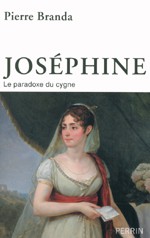You have previously published works entitled “Napoleon’s Secrets”, and “Napoleon’s Secret War: The Island of Elba 1814-1815”. In the course of your most recent research into the life of Josephine have you discovered many secrets?
For many years I had been wondering about a sort of “Josephine mystery”. The more research I did on Napoleon, the more their relationship seemed incongruous or, at the very least, surprising. And I was unsatisfied by the traditional explanations, which (it must be said) were often the result of unreliable psychology. As I tried to understand the nature of their relationship, what surprised me was the intense complicity that united them. When alone they were almost like twins. Supposedly, Josephine's first husband had kept her at a distance because of her “tyrannical” nature! Between Napoleon and Josephine though the differences seemed flagrant, when all is said and done they were only superficial. Like Josephine, Napoleon the unrepentant gambler, loved risk. In order to seduce her he had to resemble her. And that is without a doubt one of the principal lessons of this story. On a more factual level, for example I address the subject of one of the big dramas of her life – her sterility with Napoleon. This profoundly destabilised and even damaged the story not only of the Empress but also that of the dynasty of which Napoleon dreamed. This question, crucial for the reign of Napoleon, was to be the locus of all sorts of upsets and cynical attacks! In any case, for ten years Josephine's life was poisoned by it. This affair made her appear older – in the eyes of others – than she really was. Was her premature menopause typical of women from the Caribbean? With the help of specialists we re-opened her medical file and arrived at some very different conclusions.
In the first part of your book, you focus on the early years of ‘Marie-Rose’, the name with which “Josephine” was baptized. Indeed you refer to her thus for about a hundred pages. Later you even suggest that Napoleon renamed his fiancés “almost as if they had to be re-baptized in order to enter his world”.
 Indeed it was high time to bring Marie-Joseph-Rose Tascher de La Pagerie back to life. She was the great voiceless character in this history, whereas just about all the other major players of the epic had written down their memories. With each new publication, a certain image of Josephine and her reputation was reinforced, despite the fact that it was at many points far removed from historical reality. In the end, the official image (combined with deliberately malevolent propaganda) predominated and otherwise obscured or at least overshadowed her immense strength of character and her political acumen. What came out on top was her supposed amorous deviations. In the book I spend quite some time on her relationship with Barras [one of the five Directors of the French First Republic]. After studying the sources, it would appear improbable that they were lovers. It is without the help of a protector that, between 1794 and 1795, Josephine comes (you could almost say) back from the dead after her detention at the Carmes prison. Indeed when one looks at her correspondence, it is hard to conclude otherwise. Josephine had exceptional relational skills, but she was not a courtesan. She was sure of herself and of her rights and could even be a lioness in adversity. Never forget that for Josephine – as for everyone else – her destiny was not determined in advance. So, she had to improvise and adapt boldly and with nerve, rather like a poker player with an unreadable face. She had to be of that calibre in order to know how to play the game and in the end pick up the chips. After all, to espouse change is one thing, to embody it is far more difficult.
Indeed it was high time to bring Marie-Joseph-Rose Tascher de La Pagerie back to life. She was the great voiceless character in this history, whereas just about all the other major players of the epic had written down their memories. With each new publication, a certain image of Josephine and her reputation was reinforced, despite the fact that it was at many points far removed from historical reality. In the end, the official image (combined with deliberately malevolent propaganda) predominated and otherwise obscured or at least overshadowed her immense strength of character and her political acumen. What came out on top was her supposed amorous deviations. In the book I spend quite some time on her relationship with Barras [one of the five Directors of the French First Republic]. After studying the sources, it would appear improbable that they were lovers. It is without the help of a protector that, between 1794 and 1795, Josephine comes (you could almost say) back from the dead after her detention at the Carmes prison. Indeed when one looks at her correspondence, it is hard to conclude otherwise. Josephine had exceptional relational skills, but she was not a courtesan. She was sure of herself and of her rights and could even be a lioness in adversity. Never forget that for Josephine – as for everyone else – her destiny was not determined in advance. So, she had to improvise and adapt boldly and with nerve, rather like a poker player with an unreadable face. She had to be of that calibre in order to know how to play the game and in the end pick up the chips. After all, to espouse change is one thing, to embody it is far more difficult.
Your book shows Josephine as a woman of elegance and extravagance, – though, as you highlight, that is exactly what was expected from women of her rank – but you also reveal her political side: Josephine’s links with the freemasonry, and her jousts with the Bonaparte family or with Fouché. Would you say that within this couple, as intimate as it was political, Josephine was the “female power double” of Napoleon?
Josephine and Napoleon adored the theatre of power. They excelled at it, and indeed took great pleasure in playing it out together. They were a perfect fit, and this greatly facilitated their irresistible march towards power. People were fascinated, astonished and subjugated by the “Eagle” but they were also slightly alarmed. The “Incomparable” Josephine smoothed the rough edges off his image. A multitude of adjectives describing her attitude in society survives. She was: appreciated, delicate, elegant, altruistic, touching, charming, and soothing. Not a bad word passed her lips, nor did she lose her temper. Josephine was the exact opposite of Napoleon, who was angry, impatient, lively and explosive. Her presence provided the necessary serenity to the cold and resolute exercise of power. Venus as a counterpoint to Mars. The idea was certainly not new but it had the merit of being easily understood. In that sense, yes she was undoubtedly the “female double” of Napoleon's power.
Is there still an aspect of the “swan” that remains a mystery for you?
Her relationship with Captain Charles between 1796 and 1799 remains in part enigmatic for me. Everything indicates that if there was a relationship, it happened later and was shorter than has been previously suggested. I also explain myself in the book very openly by laying out the relevant evidence for and against. Because, ultimately, my aim was to carry out the most exhaustive and accurate investigation possible. In the case of Josephine, source criticism has often been neglected in order to corroborate the romantic version of the life that we thought we knew well.
(Translation Rebecca Young)
More information about Joséphine: Le paradoxe du Cygne.
Forward by Pierre Branda (translation in English).


